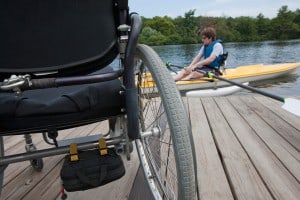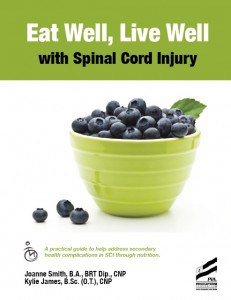

Avoiding spinal cord injury health complications requires staying healthy in the first place — and the key to that is prudent maintenance:
1. Take Care of the Skin You’re In: Ignore any skin puncture or abrasion at your peril and know you are flirting with disaster. Unattended problems, pressure points or wounds — especially on the feet and butt — can get out of control quickly, often culminating in surgery and several months of down time. A skin problem is also a gift that keeps on giving — we rarely if ever heal back to good as new. Any skin sore, even after fully healing, will always remain an area of greater vulnerability. Be especially careful with heating pads, hot compresses and heated car seats.
2. A Clean Pee is Infection-Free: Intermittent cathing, indwelling or supra-pubic all involve a foreign object entering and exiting the bladder — and with them the risk of malicious and opportunistic bugs going along for the ride. Once established in the bladder, harmful bacteria can foul up the entire urinary tract and result in body-wide symptoms. UTIs often need to be treated with antibiotics, which can also create problems throughout the body and are notoriously unkind to the digestive system. Cleanliness is an absolute must. It’s also wise to keep the pipes flushed and what’s in them watered down. A good preventative maintenance maxim? “The solution to pollution is dilution.”
3. Ya Gotta Move to Get Movement: Establishing and maintaining both a healthy diet and scheduled bowel routine helps prevent painful hours on the throne or unwelcome surprises that are sure to spoil the day. Neurological disease or dysfunction often comes with complications with the digestive tract and excessive inactivity only compounds irregularity. The system runs best when it’s within a body in motion. The more motion, the better things run through the system. Keep in mind that what goes in has to come out, and some high-fiber foods — and plenty of liquids — help everything come out in a more comfortable, regular and expeditious manner.

4. You Really Are What You Eat: The sedentary lifestyle combined with a lousy diet can quickly lead to added poundage, obesity, diabetes, high cholesterol and an elevated risk of heart problems and stroke. And every added pound is one more that has to be transferred from chair and back — and one more pound needing to be pushed. Lose weight by either cutting down on intake, burning off more calories than you take in, or both. Get in the habit of reading the nutritional facts box on foods for an idea of just how much some foods help pack it on. Eat fruits, vegetables and whole grains, and go easy on the red meat, fats, carbs, soda and alcohol. And remember that due to lower-body atrophy, “ideal weight” for wheelers is usually 10 pounds less than for ambulatory people.
5. Feel the Burn: Sports or a regular fitness routine, coupled with a reasonably active life — leaving home to shop, run errands, visit friends or go places — keeps the blood flowing, muscles and joints moving, and calories burning. Helpful sports range from tennis and handcycling to racing and rugby. Exercise regimens could involve elastic bands, free weights, machine weights, stretching and yoga, table-top cycles or regular wheeling. Fitness helps the body operate relatively free of pain, and fosters optimism, a sense of well-being and control. As with sports, participating in fitness classes such as yoga or chair-aerobics can keep you engaged with others as well as committed — 30-minute sessions three times a week can make a difference. Also, regular exercise is a reliable mood elevator and good hedge against depression.
6. Join a Club: Life on wheels is often isolating — few people are aware of our challenges, our needs, or the true extent of our physical compromise, and so the support of fellow wheelers and knowledgeable friends should be both valued and nurtured. Social support — in addition to activity — is known to increase perceived well-being and decrease depression. Regular social activities with others such as dinners, cook-outs, films, classes, team sports or other activities all serve to keep us engaged and active, stimulated and challenged.
7. Get a Flu Shot. Though a bit more controversial, given the implications of infection to a compromised system, a flu shot seems worth any perceived inconvenience in obtaining one. Often available at stand-alone or grocery store pharmacies as well as many clinics, an annual inoculation would appear to be prudent and wise.
Bonus Tip: Quit Smoking! Despite all the known risks and side-effects, many people continue to smoke. Combining those risks with a compromised respiratory system is asking for problems. The pay-offs for quitting are huge and indisputable.
Support New MobilityWait! Before you wander off to other parts of the internet, please consider supporting New Mobility. For more than three decades, New Mobility has published groundbreaking content for active wheelchair users. We share practical advice from wheelchair users across the country, review life-changing technology and demand equity in healthcare, travel and all facets of life. But none of this is cheap, easy or profitable. Your support helps us give wheelchair users the resources to build a fulfilling life. |


Excellent advice!!!
Great, simple regime to follow! I’m bookmarking this as a “go-to” reference for any of my blog articles on health.